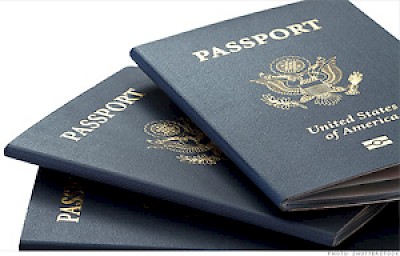Intro to US Expatriate Taxes
Editor's Note: This article was submitted to us by a new advertiser on our website, John Ohe with Hola Expat. We felt that this is important information to pass on, as any American expatriate living in Yucatan should be aware of the requirements for filing taxes in the USA. If you have anything to add to this, we welcome your information in our Comments section. Also, if you have additional questions, please ask those in the Comments section as well... we will encourage John to answer the questions and perhaps write us another article with more detail if people show an interest.
*****
FACT: American expatriates are subject to United States income taxes, regardless of where they live and where they make their income.
For 2013, Americans with income over $9,750 USD (or married couples filing jointly with income over $19,500 USD) must file a federal tax return, wherever they live in the world. It is important to note that self-employed Americans have a much lower threshold. They are obligated to file a tax return if they have $400 USD or more in earnings.
The failure-to-file penalty is 5% of the unpaid tax amount (per month), with the maximum penalty capped at 25%. Furthermore, there is a minimum penalty of either $135 USD or 100% of the unpaid tax amount (whichever is smaller) when the tax return is filed more than 60 days beyond the normal due date or extension date. Over the past few years, the IRS has been increasing its scrutiny over American expatriates, so “better safe than sorry” is an applicable quote if you are an American citizen living outside the United States.
Without a doubt, the filing requirements cast a wide net... a wider net than they used to. But many American expatriates end up not owing taxes because of certain exclusions and credits available to the expatriate community. The most important of these are the foreign earned income exclusion (FEIE) and the foreign tax credit. With the FEIE, up to $97,600 of foreign-earned income while living abroad can be excluded from federal income tax. The $97,600 USD works in conjunction with other deductions. As a result, one can have more than $100,000 USD in income, and pay no taxes. With a working spouse, the excludable amount is doubled. In order to qualify for the FEIE, one must meet either the bona fide residence or physical presence test.
With the foreign tax credit, taxes that are paid to a foreign country offset U.S. tax liabilities. The foreign tax credit is normally utilized when one has paid income tax to a country with a higher tax rate than that of the United States.
Many people with modest income do not file tax returns (e.g., are not required to file because their income falls below the dollar thresholds). However, they are losing out on valuable tax credits that are fully refundable. For example, the Child Tax Credit is worth up to $1,000 USD per child. There is a good chance of qualifying for this credit (if you have a child under the age of 17 that is a dependent) as long as your earned income is at least $3,000 USD.
Lastly, Mexico signed an intergovernmental agreement with the United States to improve international tax compliance in November 2012. That means that Mexican financial institutions will soon begin reporting to the IRS the names, tax identification numbers and balance information of American citizens with Mexican financial accounts (e.g., banks, brokerage, mutual fund, annuity, life insurance accounts). The deadline for compliance is December 31, 2014.
All American expatriates with aggregate balances in foreign financial accounts above specific thresholds are required to file the appropriate informational reports. There are two such reports that every expatriate should know about. The first is called FinCen 114 (formerly known as FBAR). The threshold is met if the aggregate balance (combining all the accounts) exceeds $10,000 USD at any point during the year. The second report is Form 8938 (FATCA), and for that, the threshold is much higher. For expatriates filing an individual tax return, the threshold is $200,000 USD aggregate balance on the last day of the year, or $300,000 aggregate balance at any point during the year. For expatriates who are married filing jointly, the threshold is double.
The penalties for failing to disclose are even more onerous than the filings themselves. With the FinCen 114, failure to report carries a penalty up to $10,000 USD. Willful non-compliance potentially raises the penalty up to $100,000 or 50% of the taxpayer’s foreign assets (whichever is greater). With FATCA, the maximum penalty for failing to file Form 8938 is $60,000 USD for each foreign asset that you failed to report (even more onerous than for the FBAR). Again, better safe than sorry!
Disclaimer: The information provided in this article has been written by John Ohe, a managing partner at HolaExpat.com. The article is for general information, and should not be construed as personal tax advice. Tax laws and regulations change frequently, and their application can vary widely based on the specific facts and circumstances involved. If you would like to submit a tax-related question, please email John at info@holaexpat.com.







Comments
Fernando 8 years ago
Hi, great information. Considering becoming an expat in the next couple of years. Do you know where can I find information regarding starting a small business/incorporating in Mexico and how would this affect my US taxes?
Thanks
Reply
Grace Fuentes 12 years ago
We just purchased a house on the beach in the Summer of 2013. We looked for the right beach property for years, whenever we'd visit my husband's mother in her house that she lives in during the winter. We finally found it in a somewhat roundabout way - by checking Yucatan Craigslist. Best of luck
Reply
Lynette Landry 12 years ago
This is useful information, thank you for Sharing! We are retired and our house is on the market; as soon as it sells we will be Yucatan bound!
We are hoping to rent a house on the beach until we get our bearings and then buy. The other alternative is to rent a house on the outskirts of Merida. Do you have any advice on which if any areas to avoid and reliable realtors? My husband speaks Spanish and I plan to learn as soon as possible. Any advice you can give us will be appreciated.
We will also be looking for friends and hope to meet you when we get there!
Best Regards,
David and Lynette Landry
Reply
(0 to 3 comments)